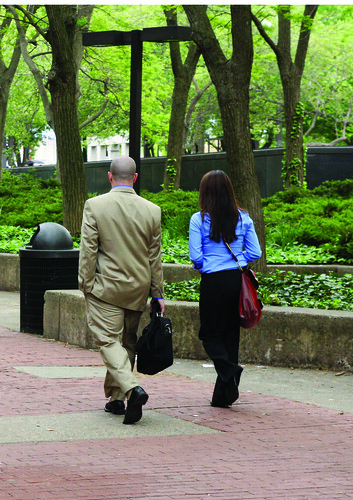Under the Fair Labor Standards Act, unpaid interns should technically be earning no less than minimum wage.
Faced with limited job opportunities and a looming recession, many college students have turned to unpaid internships for educational experience and career advancement. But unpaid interns have been increasingly more likely to perform the duties of paid employees, leading state and federal regulators to question the legality of these non-compensated positions.

Between the 2008-2009 and 2009-2010 academic years, the Career Center at Temple saw a 30 percent increase in the amount of internship and job opportunities. While this has not been proven to be a direct consequence of the recession, Career Center Director Rachel Brown said employers are realizing the value of hiring interns.
“Employers are looking more toward interns these days because they could possibly become full-time employees,” she said.
But Anyah White, a sophomore film and media arts and visual anthropology major, doesn’t understand why employers would rather hire unpaid interns than regular employees.
“Without pay, unpaid interns won’t put their all into their jobs,” she said. “And they’ll be the ones missing out.”
Dr. Crystal Harold, assistant professor of human resource management, said that under the Fair Labor Standards Act, unpaid interns should be earning no less than $7.25 – the current federal minimum wage rate.
FLSA and the Wage and Hour Division of the U.S. Department Of Labor established a six-criteria “test” for unpaid interns working at for-profit companies. The intern must: gain similar training to what he or she would be given in an educational environment, not displace regular employees but receive close supervision, be the primary beneficiary of the activity, not provide immediate benefits to the employer and understand that he or she is neither entitled to a paid position after completion of the program nor entitled to any compensation.
Harold said the university should take action against employers who take advantage of students.
“They should be more careful of who they let advertise to students on campus,” she said.
However, Alexei Mansour, a freshman fine arts major, said pay should depend on the nature of the job. As a high school student, he worked a paid internship at the Manchester Craftsmen’s Guild, an arts program for urban youth, in Pittsburgh.
“A paid internship or job should benefit you,” he said. “But for humanitarian service, that doesn’t need to be paid.”
At the Fox School of Business, the Center for Student Professional Development connects potential employers to Temple students and recent graduates. CSPD was responsible for placing more than 200 students in internships this year – a 27 percent increase from the 2008-2009 academic year. Associate Director for Corporate Relations Megan Rimer-Panaccio said employers must first submit detailed job descriptions, which are verified before the internships are publicized.
But CSPD cannot always guarantee that employers will follow through.
“We can screen jobs,” she said. “But what actually happens is not in our control.”
And that’s not necessarily a bad thing. Rimer-Panaccio said employers sometimes provide different projects or opportunities, but she has not received any complaints from students.
The Career Center, which posts jobs and internships for students regardless of major, uses the same discretion as CSPD when it screens employers. The Career Center reports that more than 10,000 students currently use its services.
But for students who choose not to use its services, Brown said they should steer clear of third-party recruiters. Such recruiters are currently not allowed to post jobs through the Career Center.
“If something sounds too good to be true,” she said, “it probably is.”
Brown also said students should talk to people and keep their options open.
Recognizing the potential of Temple students, the university has provided paid internship opportunities for its students. Through funding from the Office of the Provost, Temple is offering paid summer and fall internships for the first time this year. Approximately 44 positions will be filled by students.
The university has also recently announced a partnership with the National Park Service to offer between 12 and 20 freshmen per year paid summer internships, training and, upon graduation, guaranteed jobs as park rangers.
While regulators continue to investigate illegal unpaid internships, students still find them to be valuable experiences, although many said they would prefedr more positions to be paid.
“I’d still like to get a paid internship,” Paul Horner, a junior Spanish and geography and urban studies major, said. “I can’t afford to work without pay.”
Brown said she expects the amount of internships to neither decrease nor disappear in the coming months.
“A good thing to come out of this will be that people will start to have more conversations about it,” she said. “And that can never be a bad thing.”
Sherri Hospedales can be reached at sherri.hospedales@temple.edu.



Be the first to comment